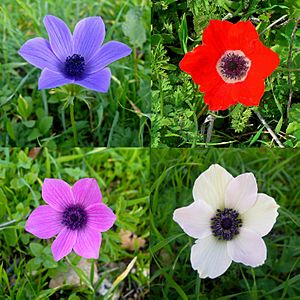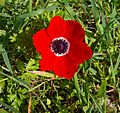Anemone coronaria facts for kids
The Anemone coronaria is a lovely flowering plant. You might know it as the Palestinian poppy or Spanish marigold. It belongs to a group of plants called Anemone. This plant naturally grows in the Mediterranean region. This area includes countries around the Mediterranean Sea. It is also the national flower of Palestine.
People love to grow Anemone coronaria because of its pretty flowers. There are many different types of this plant. Each type has been specially chosen and named for its unique look.
Contents
What is Anemone coronaria?
The Anemone coronaria is a type of plant that produces bright, colorful flowers. It is often called a "poppy" because its flowers look a bit like poppies. However, it is actually part of the Anemone family.
These plants grow from small, round tubers. Tubers are like underground stems that store food. They help the plant survive and grow each year.
Where Does It Grow?
This beautiful flower is native to the Mediterranean region. This means it naturally grows in countries like Israel, Cyprus, and other places around the Mediterranean Sea. It loves sunny spots and well-drained soil.
You can often see large fields covered in these flowers. They create a stunning carpet of color, especially in spring. These colorful displays attract many tourists.
Why Are They Popular?
Anemone coronaria flowers are very popular for gardens. They are also used in bouquets and flower arrangements. People love them because they come in many different colors. You can find them in red, blue, white, and purple.
Gardeners have created many special types of these flowers. These types are called cultivars. Each cultivar has unique features, like different petal shapes or brighter colors.
Images for kids
See also
 In Spanish: Anémona para niños
In Spanish: Anémona para niños
 | Sharif Bey |
 | Hale Woodruff |
 | Richmond Barthé |
 | Purvis Young |














